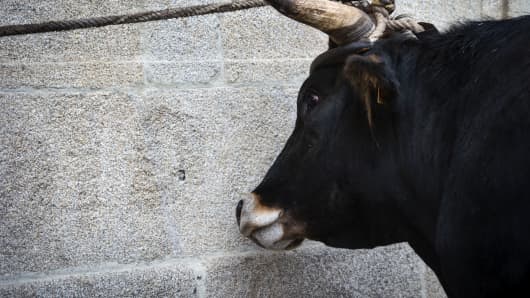Before I get to that, let me remind everyone that the third mandate of QE was higher stock prices. Ben Bernanke in rationalizing the initiation of QE2 in a Washington Post editorial back in November 2010 said in regards to QE1 and the verbal preparation for QE2, "this approach eased financial conditions in the past and, so far, looks to be effective again. Stock prices rose and long term interest rates fell when investors began to anticipate the most recent action."
He then went on to say "higher stock prices will boost consumer wealth and help increase confidence, which can also spur spending. Increased spending will lead to higher incomes and profits that, in a virtuous circle, will further support economic expansion."
Well, the belief in the wealth effect hasn't worked in this expansion. Hence, the record high in stocks last week and the 2.9 percent year over year rise in core August retail sales, both below the 5 year average and well less than the average seen in the prior two expansions.
After QE1 ended when we knew exactly the full size and expiration date (March 31st, 2010), the market topped out three weeks after and then fell 17 percent. After QE2 ended when we also knew the exact amount and deadline (June 30th, 2011), the market peaked one week later and then fell about 20 percent. Around the time QE3 ended with the lead up being a very methodical process of tapering, stocks had a hissy fit of about 10 percent only saved by James Bullard who hinted that maybe they won't end QE.
In the two months after the well telegraphed first rate hike in December 2015, stocks fell by 13 percent. The stock market of course therefore wasn't very good at discounting the end of major monetary stimulus actions even though they knew what was coming.
Subsequent rate hikes haven't had a negative influence because of hopes for U.S. tax reform and huge QE from the European Central Bank and the Bank of Japan. I do though want to remind people that Germany's DAX topped out three months ago and Japan's Nikkei is still below where it was in the summer of 2015 notwithstanding all the exchange-traded fund buying too.
As my friend and economist David Rosenberg has pointed out, 10 out of the last 13 tightening cycles has led to a recession. This tightening cycle is about to ramp up with liquidity being drawn each and every month and by another higher increment after three month intervals until at some point $50 billion per month of liquidity will suddenly disappear.
I was fortunate enough to have seen Paul McCartney Friday night at Madison Square Garden. It was amazing. As my worries about U.S. stocks have been predicated on excessive valuations coupled with Fed tightening, I will rework the Beatles song Yesterday as it relates to pre and post QE and how I think the tune markets will be singing will go over the next 12 months. As reinvestments are a form of QE because the Fed is still buying securities every month, the new era starts on Wednesday whereas Yesterday ends on Tuesday.
"Yesterday, all my market troubles seemed so far away. Now it looks as though they're here to stay. Oh, I believe in yesterday."
"Suddenly, the Fed Put is not what it used to be. There's a shadow hanging over me. Oh, yesterday came suddenly."
"Why the Put had to go, I don't know, she wouldn't say."
"Yesterday, buying the dip was such an easy game to play. Now I need a place to hide away. Oh, I believe in yesterday."
Bottom line, have stocks discounted an easy road ahead for QT or not? I'm highly skeptical as I think it's been only focused on hopes for tax reform (which would be positive LONG TERM for the economy no doubt from a competitive standpoint but I'm mostly talking multiple compression for the here and now and possibly tighter credit).
I'll say this, if the Fed pulls off QT along with more rate hikes in coming years, a soft landing is achieved and the stock market just keeps on keeping on, I will scream from some mountain top (not too high because I'm afraid of heights) that I was dead wrong.
Commentary by Peter Boockvar, the chief market analyst for the Lindsey Group and co-chief investment officer at Bookmark Advisors. Follow him on Twitter @pboockvar.
For more insight from CNBC contributors, follow
@CNBCopinion
on Twitter.



